Malaria: A Hot Mess in a Hot World

Average temperatures around the world have been rising over the past fifty years, and more severe and variable weather patterns have come along for the ride. While climate change has drastic impacts on the environment, we also are seeing significant adverse effects on human health, especially for deadly diseases.

Climate Change: A Danger to Public Health
Malaria – a mosquito-borne infectious disease that infected 214 million and killed 438,000 people in 2015 alone [1] – is particularly sensitive to climate change, with epidemics highly correlated to extended periods of increased rain and temperature. Anopheles mosquitoes, responsible for spreading malaria, mostly exist in tropical and subtropical regions around the equator (Sub-Saharan Africa, Asia and Latin America). As warmer temperatures and more extreme weather events from climate change have shifted this “malaria belt” to higher altitudes or regions that were once more temperate [2,3], different populations have become vulnerable to this deadly disease, prompting a rapid call-to-arms to address this global public health issue. How can pharmaceutical companies respond to the growing need for antimalarial treatment and sustainable practices while still operating as profit-driven businesses?
Adapting to Climate Change with Drugs
GlaxoSmithKline (GSK), one of the largest global pharmaceutical companies, has taken the lead to tackle the proliferation of malaria. Recently hailed as Fortune’s 2016 top “Change the World” company, GSK faced the challenge head-on by developing the first vaccine for malaria, a notoriously difficult endeavor given the plasmodium falciparum parasite’s ability to quickly adapt to the human immune system.
After 30 years of research and clinical trials supported by the Gates Foundation and public-private partnerships, GSK’s Mosquirix (RTS,S) anti-malarial vaccine was granted a positive scientific opinion by the European Medicines Agency in July 2015. In January 2016, the World Health Organization (WHO) announced a pilot program for the roll-out of Mosquirix to sub-Saharan Africa to be used in conjunction with other malaria control measures such as bed nets and insecticides [4].
In an effort to not price out life-saving treatment to those in need, GSK announced in March 2016 that it will no longer patent drugs in the lowest income countries [5]. Keeping this commitment, GSK agreed to set not-for-profit prices for its breakthrough antimalarial vaccine and promised to reinvest the 5% margin on top of manufacturing cost into further R&D for treatments of tropical diseases, many of which are at risk of increased epidemics due to the impact of climate change.
Mitigating Climate Change with a Value Chain Approach
GSK’s mission to “help people do more, feel better and live longer” goes beyond its breakthrough medical innovations. Core to GSK’s business is also its sustainable value chain approach to reducing its carbon footprint in raw materials, operations, logistics, product use and disposal. Since 40% of GSK’s carbon footprint comes from raw materials as shown in the graphic above, GSK and its hundreds of suppliers use an online platform called EcoDesk to gather data on carbon, water and waste and then prioritize efforts to reduce the supply chain’s environmental impacts. Over £1 billion of raw materials used in manufacturing and R&D are tracked on this system in combination with the GSK Supplier Exchange Forum that enables sharing of best practices.
Through GSK’s sustainability initiative, 60% of GSK sites have already achieved its zero waste to landfill target (100% goal by 2020). GSK focuses on not only cutting carbon in operations and products such as antibiotics and inhalers but also using less water in research labs and manufacturing sites. GSK has also dedicated significant resources to increase recycling of its products by patients and consumers, especially for inhalers that have trace amounts of greenhouse gases after use. New disposal programs in UK pharmacies led to over 500,000 inhalers properly recycled in 2012 and GSK can continue to innovate new ways to reach its ambitious environment targets [6].
Next Steps for a Greener and Healthier Future
GSK has made significant progress in achieving a principled balance of scientific innovation, social impact and profitability. While its internal operations can continue to improve its carbon footprint, the company should also invest more in making its drug products more greenly packaged and distributed. In a world where pharmaceutical companies are held to increasingly higher standards for not just financial performance but also overall benefits to society, GSK needs to strengthen its drug portfolio and R&D pipeline to address broader health impacts from climate change. The company should also prepare defensively so that it can nimbly respond to shocks in supply and demand for its own raw materials as well as the treatments it sells. With GSK’s leadership in scientific innovation and social impact, it should seek to expand its influence via more partnerships with NGOs and public/private foundations.
GSK can help accelerate medical innovation and increase public engagement, education and advocacy for a greener and healthier future.
Word Count: 799
Sources
- http://www.who.int/malaria/en/
- https://www.eurekalert.org/pub_releases/2014-03/uom-wtp030414.php
- http://scied.ucar.edu/longcontent/climate-change-and-vector-borne-disease
- http://www.gsk.com/en-gb/media/press-releases/2015/gsk-s-malaria-candidate-vaccine-mosquirix-rtss-receives-positive-opinion-from-european-regulators-for-the-prevention-of-malaria-in-young-children-in-sub-saharan-africa/
- http://fortune.com/2016/08/18/glaxosmithkline-change-world/
- http://www.gsk.com/en-gb/responsibility/our-planet/our-value-chain-approach/




Thanks for the analysis! It’s interesting that, in the case of malaria, climate change represents a profitable opportunity for GSK—although it’s admirable that GSK is forgoing profits for this vaccine by committing to reinvest margins in R&D.
It’s also admirable that GSK is working to implement sustainable practices across its supply chain. As climate change policy evolves, GSK’s approach makes me wonder how measures such as emissions taxation or offsetting requirements would be implemented across the value chain. For example, would a methodology such as that used for value-added taxation be appropriate, where each member of the supply chain is taxed for its incremental contribution to a final product’s or service’s carbon footprint? In the meantime, GSK’s supply chain-wide lens seems proactive and responsible.
Great article!
It is interesting to consider that GSK and other pharma companies may indirectly benefit from a changing climate given that an expanding region of vector-borne illnesses puts many more people (especially in higher income nations) at risk for disease. Medications for similar, so-called tropical diseases, are rarely studied or commercialized, given the lack of profits that can be realized from the generally poor populations that suffer from these illnesses. I am very impressed that GSK has decided to focus on combating a disease that disproportionately affects people in poorer nations, and that they have eschewed marginal profits in order to maximize the number of patients that can access their drug. I hope that other pharma and biotech companies follow their lead.
In terms of their sustainability practices, it is nice to see that they are taking their responsibilities so seriously. I am surprised to see that 46% of GSK’s carbon emissions come from “patients using their products.” I wonder what these activities are that are leading to such a high level of emissions. It can’t all be from inhaler use, right?
Thank you so much for the interesting read!
Thanks for sharing your insights on GSK! As malaria affects tropical and subtropical terrains, most of the countries being affected are developing countries with relatively poor healthcare infrastructure (i.e. Southeast Asia, India and sub-Saharan Africa), and therefore it is a noble act of GSK, as a profit-driven corporate, to no charge a premium despite they are the first player to come up with anti-malarial drugs. Similar to IKEA, GSK has been able to leverage their strong position to help promote awareness and set up standards for the entire pharmaceutical value chain to take on the climate change issue, and I believe that platforms such as EcoDesk help create the easy access for collaboration and should be applied by other industries/companies that are also focused on collaborative environment protection.
Rudi! Great article! It’s wonderful to hear about the sustainability work that GSK is doing. There are a number of pharmaceutical companies (including the one I profiled, Novartis) that are working on mitigating the effects of global warming by optimizing sustainability strategy throughout their supply chain. I also think that their efforts to make their vaccines accessible to the most vulnerable populations are venerable. I think that GSK might pull from Novartis’ playbook and use an internal carbon price for project investment decision-making. This approach could contribute to GSK’s continued adoption of the Sustainable Development Goals and help it further internalize their emissions/ externalities.
Thank you for this article. GSK have indeed done great work in developing the malarial vaccine RTS,S. However, I am still cautious about this vaccine; clinical trial data was unfortunately dissapointing: “Over the full duration of the trial, vaccine efficacy against clinical malaria in infants was 27% in the group that received four doses of RTS,S (3 doses at 6, 10 and 14 weeks of age, and a fourth dose 18 months later); and 18% in the group that did not receive the fourth dose of the vaccine.”(http://www.who.int/immunization/research/development/malaria_vaccine_qa/en/). Therefore, whilst GSK have done an admirable job in developing this vaccine, I question whether the economics of broadly rolling out this vaccine (at a cost of c. $5/vaccine), when potentially more effective vaccines are under development (https://www.ft.com/content/b369bf24-f833-11e5-96db-fc683b5e52db). It is certainly a difficult public health issue, and I suspect that the vaccine will ultimately not be widely rolled out.